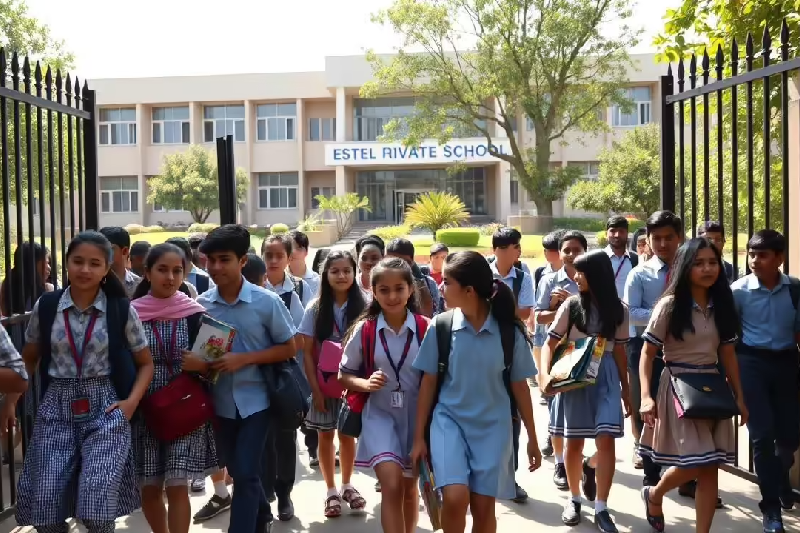
Delhi Tightens Rules: Private Schools Must Seek Government Approval Before Fee Hikes
In a landmark move aimed at protecting parents from arbitrary fee hikes, the Delhi government has passed a bill mandating all private and unaided schools in the capital to obtain prior government approval before increasing their fees.
Until now, this regulation applied only to about 350 schools built on government-allotted land with specific allotment conditions. The new law, however, expands this requirement to all private schools across the city, covering nearly 1,443 additional institutions that were previously free to set their own fees without direct government oversight.
The Game-Changer: Delhi School Education (Transparency in Fixation and Regulation of Fees) Bill, 2025
The announcement was made on Thursday by Delhi Education Minister Ashish Sood, who described the bill as a “major step towards ending arbitrary fee hikes and increasing accountability in the education system.”
“This bill is not just a formality. It is a promise to parents that fee structures will no longer be manipulated at will,”
— Ashish Sood, Education Minister of Delhi
Sood explained that the new bill closes the loopholes in the current framework, which relied heavily on the Delhi School Education Act and Rules, 1973 (DSEAR) and various court judgments. These older laws covered only a small section of schools—specifically, those operating on government land with fee restrictions written into their land allotment terms.
As a result, hundreds of private schools located on privately-owned land or on government land without such conditions operated outside the purview of fee regulation for decades.
Why the Change Was Needed
The Education Department’s records reveal a long-standing gap in regulation:
- Nearly 1,443 private schools—the majority—were not subject to any formal government approval process for fee hikes.
- Schools were barred from increasing fees for the academic sessions 2020–21 and 2021–22 due to the pandemic.
- However, this freeze was widely ignored or challenged by private institutions, undermining the government’s authority.
In fact, in an official order dated June 8, 2022, the Department of Education declared that fee hikes for 2020–21 were invalid. But without consistent monitoring, enforcement remained patchy.
Following the pandemic, the then government approved fee hikes for 227 schools, while another 262 schools submitted proposals for 2023–24. Out of these, only 28 proposals were actually reviewed, leaving the rest unchecked.
The DoE noted that several schools even secured stay orders from courts against government circulars aimed at stopping unjustified hikes, effectively bypassing oversight.
A New Era of Accountability
Under the Delhi School Education (Transparency in Fixation and Regulation of Fees) Bill, 2025, the government will now have the authority to:
- Scrutinise all proposed fee hikes by private and unaided schools, regardless of their land ownership status.
- Reject increases that are not adequately justified by audited financial data.
- Enforce penalties for non-compliance, ensuring institutions can no longer exploit regulatory gaps.
Sood stressed that the bill is designed to create a uniform, transparent fee regulation system that leaves no room for arbitrary decision-making by school managements.
The Political Back-and-Forth
The move has sparked political debate. AAP Delhi state president Saurabh Bharadwaj criticised the bill, alleging that it is politically motivated and aimed at protecting certain private schools from court-imposed scrutiny.
Bharadwaj argued that existing laws and court directions already required over 350 schools to seek permission from the Director of Education before raising fees. According to him, the bill undoes these conditions rather than strengthening them.
“The BJP minister is misleading Delhi’s middle class. This bill is designed to protect more than 350 private schools from High Court and Supreme Court rulings that previously kept their fee structures under tight scrutiny,”
— Saurabh Bharadwaj, AAP Delhi State President
The Larger Context: Fee Regulation and the Pandemic Legacy
The regulation of private school fees has been a long-standing flashpoint in Delhi’s education policy. The pandemic brought this issue into sharp focus, as parents—facing economic hardships—demanded relief from high school fees.
While the government temporarily froze fee hikes for two years, enforcement challenges allowed many institutions to bypass these restrictions. Some did so quietly; others took legal routes, leading to prolonged disputes in court.
The introduction of this bill is being seen as the government’s attempt to institutionalise fee regulation so that similar situations in the future can be avoided.
What This Means for Parents and Schools
For parents, this bill offers a safeguard against sudden and steep fee increases. It provides a clear appeal mechanism if they feel that a proposed hike is unjustified.
For schools, the bill introduces a new layer of accountability. They will now need to:
- Submit audited financial statements.
- Justify any proposed hike based on increased operational costs.
- Wait for formal government approval before implementing new fee structures.
Schools that fail to comply will face strict penalties, which could range from fines to restrictions on future fee adjustments.
Looking Ahead
The Delhi government’s decision to regulate fee hikes across all private and unaided schools marks a significant policy shift in favour of parents and transparency. While critics see it as politically charged, the move addresses a real gap in the system that has allowed unchecked fee increases for decades.
As the Delhi School Education (Transparency in Fixation and Regulation of Fees) Bill, 2025 moves forward, all eyes will be on how effectively it is implemented—and whether it truly delivers on its promise of fairness, transparency, and accountability in the city’s education system.


